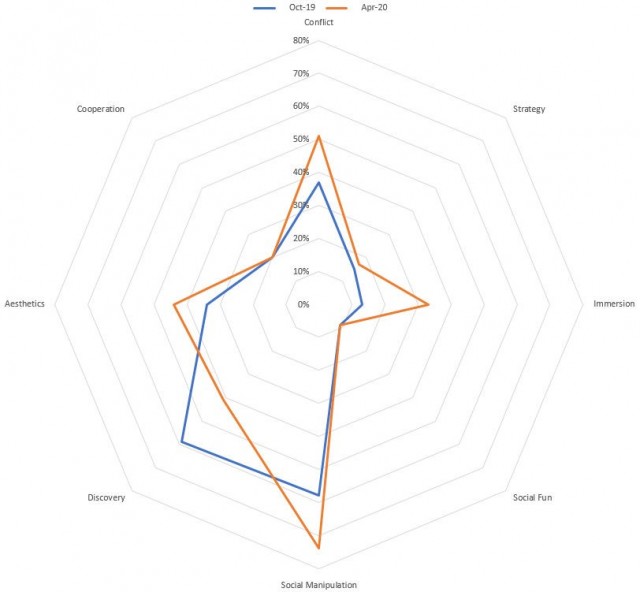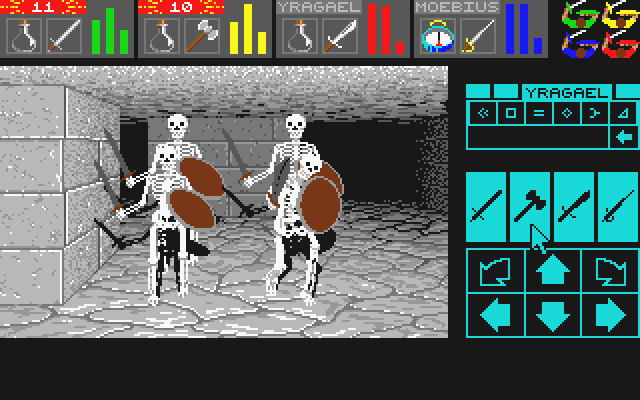Déformation professionnelle is a French phrase -- perhaps coined by the Belgian sociologist Daniel Warnotte -- that describes the phenomenon in which an individual's perceptions and behavior are unduly influenced by habits of thought and action that are acquired in the workplace.
To the extent that professional deformation determines an individual's emphases and antipathies, it will influence his choice of leisure activities, as well. The result is that workers in similar occupations can be expected to enjoy similar hobbies. Consequently, during work hours and leisure time, individuals will seek out others with the same deformity. Together, these individuals will normalize maladaptive ideas and eccentric tastes.
No survey has been taken, but it's widely believed that Information Technology professionals are vastly over-represented in online discussions about boardgames, relative to their share of the general population. In what ways has professional deformation influenced their tastes in boardgames? Let's speculate.
Determinism: to many computer software experts, randomness is scary. Computers are, by definition, deterministic and predictable. When a computer exhibits random or arbitrary behavior, the cause is almost certainly a serious hardware or software malfunction. Even in applications where randomness is required, such as in computer games or cryptography, the numerical algorithm by which the randomness is produced may not be truly random. Instead, it's mathematically deterministic. In a computer, truly random numbers (as opposed to the mathematically-determined pseudo-random numbers) can be produced only by special hardware (don't worry -- your computer has this hardware).
It's natural for a computer programmer to associate randomness with a lack of intellectual rigor since, in the office, the presence of randomness means that someone made a mistake. This association contributes to the false prejudice that boardgames with dice or other random factors are somehow less deep or intellectually stimulating than games that are entirely predictable.
There's good reason to believe that games with random factors can demand greater intelligence than purely deterministic games. Statistical reasoning, risk mitigation strategies, and spontaneous adaptation to unforeseen events are very sophisticated forms of thought. Why, then, are games with dice widely considered to be lightweights?
It's because of widespread deformity.
Memory: Psychologists consider memory to be a crucial aspect of human intelligence, yet it's common for gamers to criticize boardgames that involve memory work. In Computer Science, the storage of numerical or symbolic data is essentially a solved problem, so even though memory is a crucial human skill, memory problems are considered uninteresting and unworthy by the professionally deformed computer pro.
Communication: One of the most perilous effects of professional deformation is the tendency to privilege some cognitive skills over others. The professionally deformed IT professional will value games that reward him for applying the mental skills he uses in his work. As a result, an emphasis on relatively simple skills, like grade-school arithmetic ability, is enshrined as an important element of "heavy" games.
Games that don't place the same emphasis on calculation won't enjoy the same esteem. For example, games of bluff or intimidation, whick require players that are sensitive to non-verbal communication cues are routinely denigrated by the computer folk. It's impossible to calculate with mathematical certainty the outcome of a potential action when the data with which you're working is itself uncertain, as non-verbal cues always are. The player's bias, then, is to ignore those cues outright and, having deprived himself of any information that might influence his gameplay, disparage games of bluff as guessing games.
The Game as a Finite State Machine: Digital computers are, by definition, Finite State Machines (FSMs). FSMs aren't machines in the same sense as your 1984 Chevy Nova hatchback. An FSM is simply an abstract model of any process that has a finite number of distinct states. An important component of the FSM is the set of rules that determine how the agent following the process moves from one state to another. A movement between states is called a transition.
Some games can easily be modeled by an FSM. Others cannot. The games that best lend themselves to this model are those that limit the number of options available to a player at any given decision point. In FSM terms this means that, for any given state, the number of possible transitions is small.
Professionally deformed IT professionals love FSMs. Whether they realize it or not, they think in terms of FSMs all the time in their work. Naturally, they'll be fascinated by games that closely (or exactly) resemble FSMs. For years, professionally deformed boardgame enthusiasts have been extolling the ideal of the boardgame as FSM through their comments and game ratings on the internet. This ideal seems to have influenced boardgame design, because we now have a surfeit of Eurogames on the market that intentionally limit the choices a player can make on his turn to a very small number; these games are designed as easily-computable FSMs.
There's hope:
Of course, some people are more fully-rounded than others. Not all IT professionals suffer from these deformities. In fact, the best ones don't, since success in any field requires imagination, the ability to communicate clearly, and the ability to adapt to a variety of challenges.
These deformities, though, have clearly skewed the internet concensus about what constitutes a good game. Don't let your job dictate your aesthetics or your personality. It should work the other way around.
 Games
Games How to resolve AdBlock issue?
How to resolve AdBlock issue? 















